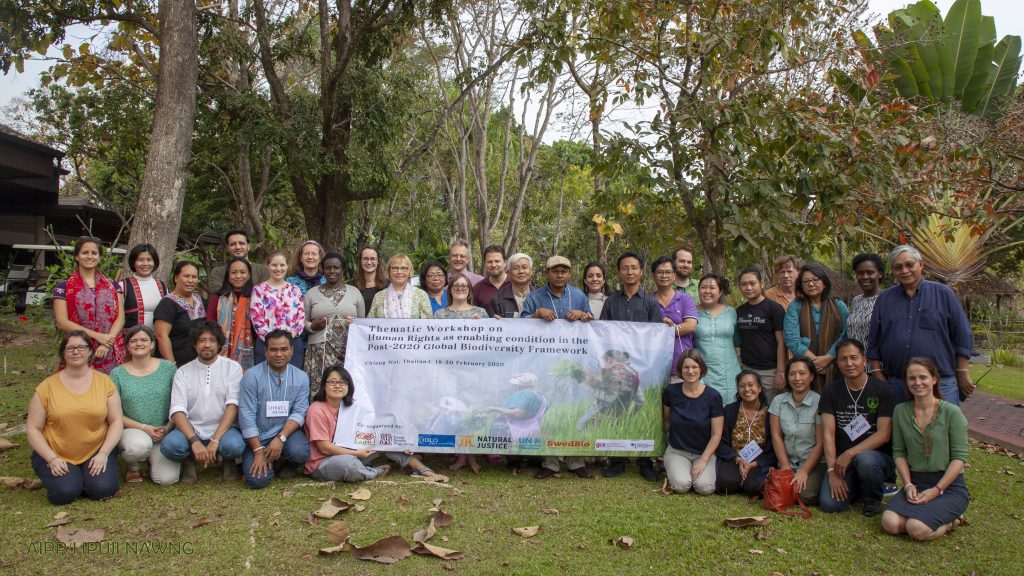Human Rights as an enabling condition in the post-2020 Global Biodiversity Framework
An expert workshop held prior to the second round of negotiations on the post-2020 framework of the UN Convention on Biological Diversity (CBD) culminated in the proposal of key points for inclusion in the existing zero draft.

Photo: Barbara Lassen
The workshop held in Chiang Mai, Thailand, over the 18-20 February 2020 was convened to discuss the existing CBD zero draft[1] in advance of the CBD negotiations which opened on the 24 February in Rome, Italy.
Major reports show that supporting indigenous peoples and communities to secure rights, governance and stewardship of their collective lands and territories is one of the most effective means of ensuring nature conservation. [2] However, the workshop found that the zero draft does not sufficiently recognise the rights and roles of indigenous peoples and communities. “Indigenous peoples are crucial partners in achieving the 2050 vision of living in harmony with nature,” said Lakpa Nuri Sherpa, Environment Programme Coordinator of Asia Indigenous Peoples Pact. “This vision cannot succeed without our full and effective participation and recognition of our customary land rights and governance systems.” The workshop called for a new target specifically on securing indigenous peoples’ and communities’ rights to their collective territories, lands and waters, in accordance with their customary laws, governance systems and management practices.
Other key messages, gaps and opportunities to strengthen human rights in the zero draft include the following:
- In order to bend the curve of biodiversity loss, we need to bend the curve of inequality. The post-2020 framework must better integrate governance, human rights and equitable sharing of benefits and costs.
- The zero draft framework takes an overly utilitarian approach, viewing nature in terms of “services” and “benefits”. It should instead be guided by the diverse worldviews, values, ethics and spiritual beliefs that embody our reciprocal relationships with the rest of the planet and should include a goal that addresses the mutual and interdependent wellbeing of nature and people.
- The zero draft framework does not sufficiently address the direct and indirect drivers of biodiversity loss. It should include a target on halting unsustainable industries and inequitable models of economic growth that harm both biodiversity and human rights.
- The post-2020 framework should include a new target on providing a safe and enabling environment in which environmental defenders, with particular attention to indigenous peoples, local communities and women, can operate free from threats, harassment, intimidation and violence.
- Target 2 in the zero draft, focusing on area-based conservation, includes a concerning sub-target on “strict protection”. This should be deleted to avoid continued and repeated human rights violations in the name of conservation. In addition, this target should include a clear reference to equitable governance of protected areas and other effective conservation measures and recognition of self-declared territories and areas conserved by indigenous peoples and local communities.
Read the full report from our partner Natural Justice here.
Footnotes:
[1] Available in English: https://www.cbd.int/doc/c/da8c/9e95/9e9db02aaf68c018c758ff14/wg2020-02-03-en.pdf and other languages: https://www.cbd.int/meetings/WG2020-02.
[2] See, for example: IPBES Global Assessment: https://ipbes.net/sites/default/files/inline/files/ipbes_global_assessment_report_summary_for_policymakers.pdf; Rights and Resources Initiative, 2015. Protected Areas and the Land Rights of Indigenous Peoples and Local Communities: Current Issues and Future Agenda. Available online at: http://rightsandresources.org/wp-content/uploads/RRIReport_Protected-Areas-and-Land-Rights_web.pdf.
